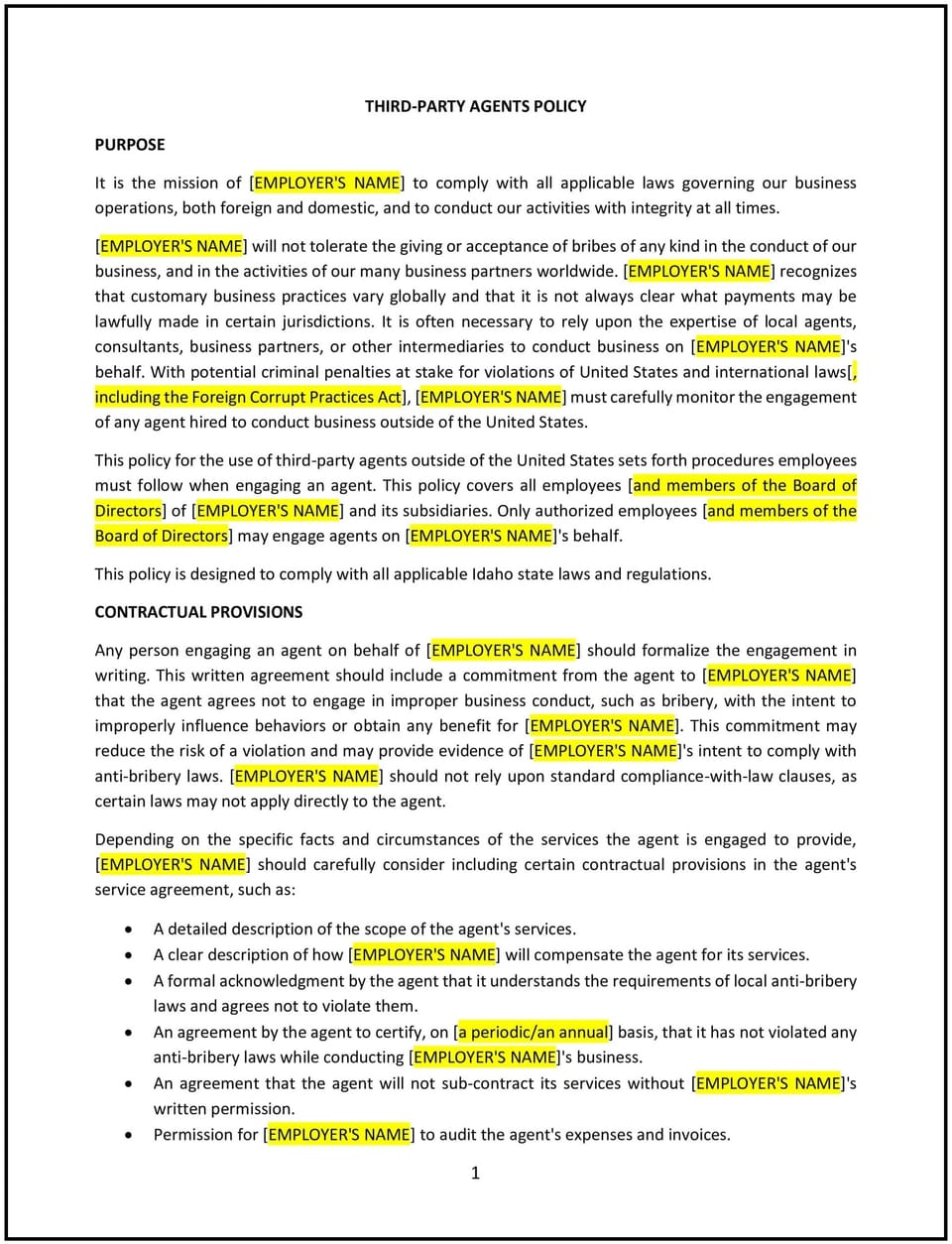Third-party agents policy (Idaho): Free template

Third-party agents policy (Idaho)
A third-party agents policy helps Idaho businesses establish guidelines for working with external vendors, contractors, or representatives who act on behalf of the company. This policy outlines expectations for third-party conduct, confidentiality, and compliance with applicable laws and regulations. It also emphasizes the importance of maintaining the business’s reputation and protecting sensitive information when engaging with third parties.
By implementing this policy, businesses can ensure accountability, reduce risks, and foster productive relationships with third-party agents.
How to use this third-party agents policy (Idaho)
- Define third-party agents: Specify who qualifies as a third-party agent, such as vendors, contractors, consultants, or representatives, to ensure clarity in applying the policy.
- Set expectations for conduct: Outline the standards of behavior expected from third-party agents, including professionalism, ethical practices, and adherence to company policies.
- Address confidentiality: Provide guidelines for handling sensitive company information, such as requiring non-disclosure agreements (NDAs) and secure data management practices.
- Establish compliance requirements: Explain the legal and regulatory obligations third-party agents must follow, such as anti-bribery laws, data privacy regulations, and industry-specific standards.
- Develop onboarding procedures: Create a process for vetting and onboarding third-party agents, including background checks, contract reviews, and training on company policies.
- Monitor performance: Regularly evaluate third-party agents’ performance, adherence to the policy, and compliance with contractual obligations.
- Review and update the policy: Periodically assess the policy’s effectiveness and make adjustments based on changes in business needs, third-party relationships, or Idaho laws.
Benefits of using this third-party agents policy (Idaho)
This policy offers several advantages for Idaho businesses:
- Ensures accountability: Clear guidelines help third-party agents understand their responsibilities and the consequences of non-compliance.
- Reduces risks: The policy minimizes the risk of legal disputes, data breaches, or reputational damage caused by third-party actions.
- Protects sensitive information: Confidentiality requirements safeguard company data and intellectual property when shared with third-party agents.
- Promotes ethical practices: The policy reinforces the business’s commitment to ethical behavior and compliance with applicable laws and regulations.
- Enhances relationships: Structured procedures foster trust and transparency in relationships with third-party agents, leading to more productive collaborations.
- Supports compliance: The policy helps businesses adhere to legal and regulatory requirements related to third-party engagements.
Tips for using this third-party agents policy (Idaho)
- Communicate the policy clearly: Share the policy with third-party agents during onboarding and through contractual agreements to ensure awareness and understanding.
- Train third-party agents: Provide training on the policy, including expectations for conduct, confidentiality, and compliance with applicable laws.
- Monitor compliance: Regularly review third-party agents’ adherence to the policy and address any potential issues promptly.
- Stay informed about legal updates: Keep up-to-date with changes to Idaho and federal laws related to third-party engagements and update the policy as needed.
- Encourage transparency: Foster open communication with third-party agents to address concerns, provide feedback, and strengthen relationships.
- Document everything: Maintain records of contracts, NDAs, training sessions, and performance evaluations to ensure accountability and transparency.
Q: Why should Idaho businesses have a third-party agents policy?
A: A third-party agents policy provides clear guidelines for working with external vendors, contractors, or representatives, ensuring accountability, reducing risks, and protecting sensitive information.
Q: What types of third-party agents should businesses address in the policy?
A: Businesses should address vendors, contractors, consultants, and representatives who act on behalf of the company, ensuring they adhere to the policy’s standards.
Q: How should businesses handle confidentiality with third-party agents?
A: Businesses should require third-party agents to sign non-disclosure agreements (NDAs) and follow secure data management practices to protect sensitive information.
Q: What compliance requirements should businesses include in the policy?
A: Businesses should outline legal and regulatory obligations, such as anti-bribery laws, data privacy regulations, and industry-specific standards, that third-party agents must follow.
Q: How can businesses monitor third-party agents’ performance?
A: Businesses should regularly evaluate third-party agents’ adherence to the policy, compliance with contractual obligations, and overall performance.
Q: What steps should businesses take to onboard third-party agents?
A: Businesses should vet third-party agents through background checks, contract reviews, and training on company policies before engaging their services.
Q: How often should businesses review their third-party agents policy?
A: Businesses should review the policy annually or as needed to ensure it aligns with current business needs, third-party relationships, or Idaho laws.
This article contains general legal information and does not contain legal advice. Cobrief is not a law firm or a substitute for an attorney or law firm. The law is complex and changes often. For legal advice, please ask a lawyer.


